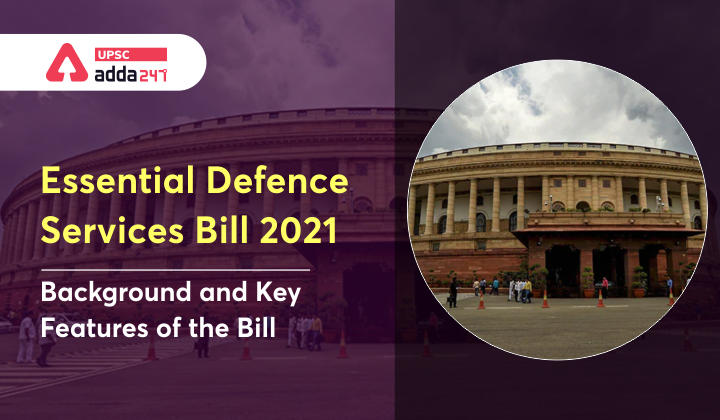Table of Contents
Relevance
- GS Paper 2: Parliament and State Legislatures – structure, functioning, the conduct of business, powers & privileges and issues arising out of these.

Get free video for UPSC CSE preparation and make your dream of becoming an IAS/IPS/IRS a reality
Context
- Recently, the Essential Defence Services Bill, 2021, was passed in the Rajya Sabha.
Background
- Earlier, the Cabinet approved the plan to convert 41 factories into seven government owned corporate entities for better management.
- Following this, the employee unions had announced a plan to go on an indefinite
- Promulgation of the Essential Defence Services Ordinance (EDSO)-2021: By the government which bans all strikes by defence-civilian employees.
- Aim: To prevent the employee unions of the Ordnance Factory Board (OFB) from going on strike against the corporatisation plan that was announced.
- But Employees have the right to peaceful protest.
- The union government has brought the Essential Defence Services Bill, 2021 to replace the Essential Defence Services Ordinance (EDSO)-2021.
Government’s reasoning for the bill:
- To ensure the maintenance of essential defence services so as “to secure the security of the nation and the life and property of the public at large.
- To prevent staff of the government-owned ordnance factories from going on strike.
- To prohibit strikes and lockouts in any industrial establishment or unit engaged in such services.
Fast Track Special Courts (FTSCs) in India: Context, Meaning, Need, Advantages and Way Forward
Key provisions of the bill
- Essential defense services: include any service in:
-
- any establishment or undertaking dealing with the production of goods or equipment required for defence-related purposes,
- any establishment of the armed forces or connected with them or defence.
- services that, if ceased, would affect the safety of the establishment engaged in such services or its employees.
- In addition, the government may declare any service as an essential defence service if its cessation would affect the:
-
-
- Production of defence equipment or goods.
- Operation or maintenance of industrial establishments or units engaged in such production, or
- Repair or maintenance of products connected with defence
-
- Amends Industrial Disputes Act, 1947: to include essential defence services under public utility services.
- Defines strike: as cessation of work by a body of persons acting together. It includes:
- Mass casual leave,
- Coordinated refusal of any number of persons to continue to work or accept employment,
- Refusal to work overtime, where such work is necessary for the maintenance of essential defence services, and
- Any other conduct which results in, or is likely to result in, disruption of work in essential defence services.
- Prohibition on strikes, lock-outs, and lay-offs: the central government may prohibit strikes, lock-outs, and lay-offs in units engaged in essential defence services. This can be done on the following grounds-
-
- Sovereignty and integrity of India,
- Security of any state,
- Public order,
- Public decency, or morality.
-
- The prohibition order will remain in force for six months and may be extended by another six months.
- Punishments for offenses: All offences punishable under the Bill will be cognisable and non-bailable.
- For illegal lock-outs and lay-offs: Violators will be punished with up to one-year imprisonment or Rs 10,000 fine or both.
- Punishment for illegal strikes: Persons commencing or participating in illegal strikes will be punished with up to one-year imprisonment or Rs 10,000 fine or both.
- Sunset clause: It will not come into effect unless it is invoked and is in place for only one year after which it will lapse.
Read more Prelims Specific Articles- 5 August 2021



 TSPSC Group 1 Question Paper 2024, Downl...
TSPSC Group 1 Question Paper 2024, Downl...
 TSPSC Group 1 Answer key 2024 Out, Downl...
TSPSC Group 1 Answer key 2024 Out, Downl...
 Cabinet Ministers of India 2024, New Cab...
Cabinet Ministers of India 2024, New Cab...







